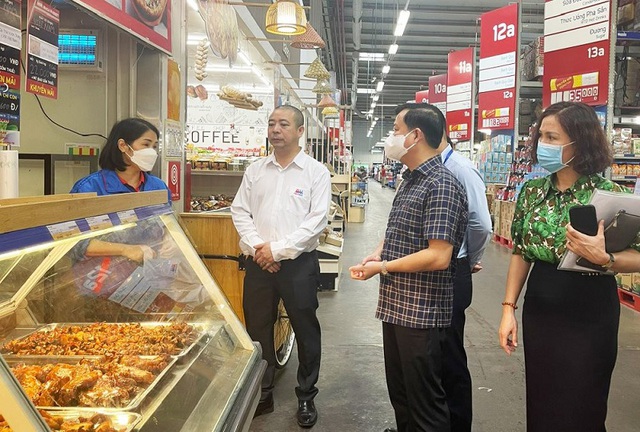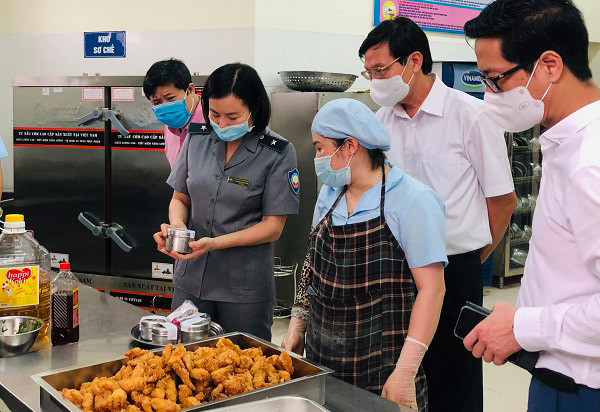Hanoi pushes ahead with food safety enforcement
Hanoi has been working with neighboring provinces to control the sources of food supplies to the city and ensure food traceability.
The Hanoi Food Safety Steering Committee has stepped up its oversight and inspections, including short-notice visits to food manufacturing and commercial companies, food service providers, and street food vendors.
According to Tran Sy Thanh, Chairman of the city People's Committee, ensuring food safety management at all levels is essential, as is raising awareness of the responsibilities of local governments and informing customers.
He underlined the importance of innovating diverse and regular communication methods and forms, thereby changing the awareness of all levels and sectors, especially grassroots and people, about food safety and having peak periods and serious responses to food safety violations.
The move has gradually raised awareness among producers, traders, and consumers while addressing violations, according to the Hanoi Food Safety and Hygiene Department.
The city has more than 77,000 businesses involved in food production, processing, trade, and street vending. These include more than 10,000 food producers, nearly 25,500 food traders, more than 35,000 food service providers, and about 5,800 street food vendors.
A food safety and hygiene inspection at a supermarket in Bac Tu Liem District. Photos: Hanoimoi |
Hanoi has also put in place a thorough program to ensure food safety, with 701 inspection teams visiting over 12,500 establishments during Food Safety Action Month 2024; of these, over 10,500 (84.1%) complied with regulations, while 1,814 were found to be in violation.
The city has worked with neighboring provinces to control the sources of food supplied to Hanoi and ensure food traceability. "Ensuring food safety has required close cooperation among various agencies and institutions responsible for food safety management," the department said.
To prevent food poisoning, Hanoi has set up a model to control food safety in all kitchens of 214 primary schools in five districts and five wards in the city. As a result, food safety management in canteen kitchens across the city has been under close scrutiny.
Hanoi has emphasized the role of local governments, management agencies, social organizations, and consumers in raising awareness among producers and traders to comply with food safety regulations and to promptly address any food safety incidents.
The department added that after more than six years of implementing the food safety model, Hanoi has set up 60 civilized food safety streets in 30 districts and cities, involving thousands of businesses.
Stricter management of food safety, especially where products are sourced, needs to be implemented more rigorously, said Chu Xuan Kien, Director of the Hanoi Market Surveillance Department.
"Food safety and hygiene regulations in restaurants, street vendors, and facilities that produce bottled and packaged beverages should be better inspected and supervised by the local government, according to Hanoi's requests. Any business that does not comply with food safety regulations or does not have the required certifications will be suspended and the infractions will be made public," Kien added.
In the first half of 2024, food poisoning affected more than 2,100 people nationwide. Food safety expert Vu The Thanh told The Hanoi Times that the current weather is a prime time for food poisoning cases due to bacterial growth, especially bacteria that cause gastrointestinal diseases, toxic substances in plants, fruits, aquatic products, and improper processing and storage of ingredients and food.
The interdisciplinary inspection team at Chu Van An Secondary School (Thanh Tri District). |
Dr. Nguyen Duy Thinh, former lecturer at the Institute of Technology and Food under Hanoi University of Science and Technology, said the recent surge in mass food poisoning incidents is alarming.
Most food is stored in large quantities, and because of bulk purchasing, establishments cannot be selective with ingredients, and prolonged storage increases the risk of food contamination, he explained.
"Managing food safety at such stalls and mobile vendors is a challenge, as many businesses do not have clear product origins, manufacturing and expiration dates. Therefore, strengthening food safety management, especially product origin management, must be carried out more strictly than ever," Thinh told The Hanoi Times.
Chairman Tran Sy Thanh has asked all local authorities to take measures to prevent and combat food poisoning, especially in tourist areas, school canteens and industrial zones.
He urged localities to urgently develop an effective food safety incident alert system to provide timely emergency response and treatment for food poisoning victims.
He said authorities should take decisive action to suspend operations of establishments that fail to ensure food safety conditions or lack the necessary food safety certificates. In addition, consumers are encouraged to increase their awareness of safe food choices for the sake of their health.












